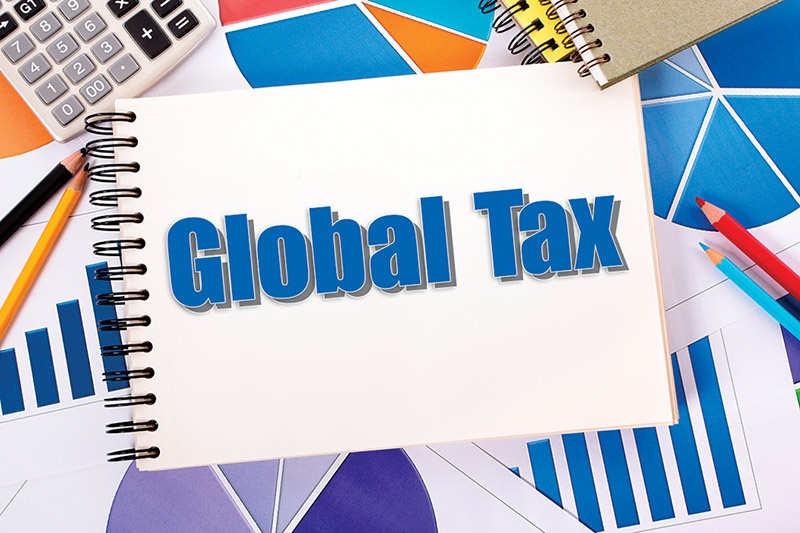INTERNATIONAL INVESTMENT
AND PORTAL
 Last year, around 140 countries and territories agreed in principle to set up a minimum corporate tax rate-illustration photo, Source:Freepik.com
Last year, around 140 countries and territories agreed in principle to set up a minimum corporate tax rate-illustration photo, Source:Freepik.com
At a conference on May 10, the Vietnam Association of Foreign-Invested Enterprises (VAFIE) released its first annual report on foreign direct investment (FDI) in the country. One of the discussion points at the event was the topic of a global minimum corporate tax and its potential impact on Vietnam’s FDI prospects.
Last year a landmark agreement was reached on a minimum global corporate tax rate of 15 per cent. However, the proposal is still in its early stages and getting the majority of nations to come to implemented it may take plenty more time.
“Large corporations often choose to pour money into nations with good tax regimes and more incentives. If the global minimum tax of 15 per cent is applied, it will certainly have a big impact on businesses in Vietnam,” said Hong Sun, vice chairman of the Korea Chamber of Business in Vietnam.
Anticipating the shift in capital flow, the government last October issued more special investment incentives. Accordingly, depending on the extent to which the criteria set by the government are met, investors now only have to pay corporate income tax at the interest rate of 5-9 per cent over 30-37 years.
Nguyen Quoc Hung, deputy director of the Department of International Cooperation at the Government Office, said, “There have been some movements from foreign investors who could be affected by this tax move. Earlier this year, multinationals reached out to the government and since then, the government asked the Ministry of Finance to consider and propose solutions.”
A global minimum tax is intended to protect the interests of large capital-exporting nations. According to Hung, it is easy to see why countries with large outbound investment capital, such as the United States, Japan, and South Korea are keen to implement it. “These countries are pushing for a global minimum tax to be put into practice at the beginning of 2023 to gain a significant amount of benefits. Meanwhile, Vietnam’s outbound investment was less than $1 billion in 2021, so the main need for us is still to attract foreign investment. Likewise, countries that receive large investment sources will certainly be negatively affected,” Hung assessed.
Partly thanks to preferential policies, especially those for high-tech projects with a 10 per cent tax rate for 10-15 years, Vietnam has attracted billions of US dollars in investments from large corporations such as Intel and Foxconn, to name a few. Among these giants, more than half of Nike’s shoe production, and 40 per cent of Adidas shoes are located in Vietnam. Apple and Foxconn have also chosen Vietnam as the first country outside of China to produce iPads.
But according to VAFIE chairman, Professor Nguyen Mai, the attraction of FDI is not limited to tax but also dependent on other policies related to political institutions, support from the government, management mechanisms, and open trade agreements, among other factors.
“It is necessary to set up a government working group to come up with solutions to this issue,” Mai noted. “The priority should be finding a solution to maximise benefits while reducing negative impacts if Vietnam participates in this global tax policy.”
Currently, capital-exporting countries, especially members of the Organisation for Economic Co-operation and Development (OECD), are actively promoting the internalisation of OECD guidelines, thereby collecting additional revenues from outward investment activities through subsidiaries when consolidating reports on groups’ global earnings.
Meanwhile, for developing countries that need to attract investment, the measures under consideration are also internalising the guidelines on global minimum taxes so as not to reduce taxes for capital-exporting countries, as well as renegotiating investment contracts with foreign investors. This solution was also mentioned in the policy recommendations section of the annual FDI report released by VAFIE last week.
Nevertheless, Vietnam is deemed to be on the right track in terms of major funding attraction, as demonstrated by popular groups such as LEGO pouring new money into the country. “In August last year, we initiated a discussion with both a deputy prime minister and local governments. Since then, calibration has been professional and incredibly helpful,” said Carsten Rasmussen, COO of LEGO Group. “We have profoundly studied Vietnam’s legal framework, including tax legislation, and we have determined that Vietnam is our ideal priority for Asian investment expansion.”



















